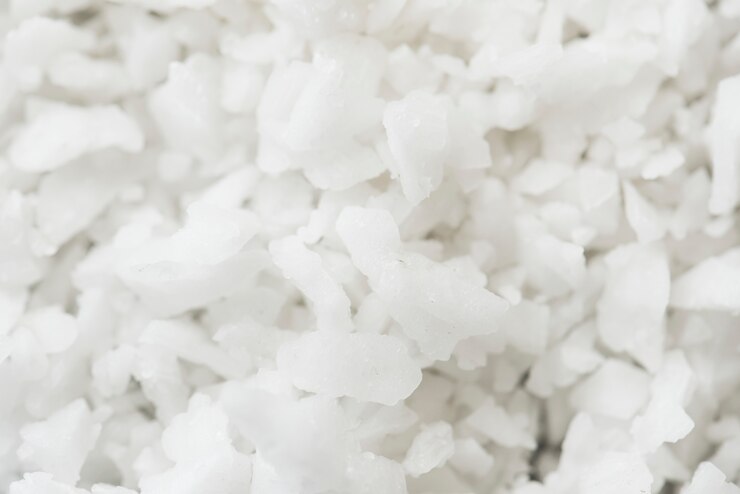Published by Glory Ugonma Itiafe

Photo caption: Freepik
Niniola Apata is a popular Nigerian Afrobeats artist who blends Afrobeats, house music, and amapiano, a South African music genre, in her sexually expressive Yoruba lyrics, which empower women to embrace their sexuality.
Her new song, “Ginger Me,” includes a reference to using alum for vaginal tightening.
A part of the lyrics reads, “Lo alum, lo alum tó ba fé ko tight, lo alum lo alum s‘abé die, wa ri pe o ma tight,” which translates to “Use alum if you want it to be tight, use alum in your vagina, you’ll see how tight it will be.”
The song has sparked viral discussions on social media, raising concerns about the health implications of this claim. Given alum’s use in popular culture and the need to verify its safety for vaginal application.
Chinonso Egemba, a medical doctor and health influencer known as Aproko Doctor, made a video to speak on this.
Another medical doctor and health influencer, Ajidahun Olusina (@the_beardedsina), along with X users @moraadeke and @romsha_u, expressed shock, questioning the misinformation in the song.
Other tweeps @fertitude, a health page on X, and @slimveetah warned against the practice, while @gagosaurus praised Niniola, saying she was so real for the advice.
Considering the virality, and conversation generated by the controversial lyrics in Niniola’s latest hit, “Ginger Me,” coupled with the age long widespread myth that alum safely tightens the vagina, DUBAWA decided to fact-check the claim.
Verification
Alum, a double sulfate salt of aluminium (potassium alum), contains astringent, acidic, and antibacterial properties, making it suitable for cooking and cosmetics. Given these properties, is it safe for vaginal use?
Vaginal tightening is an enduring cultural phenomenon passed down simply for the sake of enhancing sexual pleasure. In Nigeria and other African countries, intravaginal practices, sometimes called “washing and setting,” include using substances like alum for perceived tightening effects.
A 2020 study on cultural practices affecting vaginal microbiota in sub-Saharan Africa and among Black American women found that 79% to 89% of women reported using substances like alum for vaginal tightening.
According to this study conducted on sub-Saharan African and black American women, traditional practices like vaginal tightening are often viewed as rites of passage into womanhood. They are typically passed down from older women, such as aunts, mothers, or grandmothers, to younger generations.
Tayo Ojo, a resident doctor in the Department of Family Medicine at Ekiti State University Teaching Hospital, acknowledged the myth surrounding alum’s use for vaginal tightening but said there is no scientific basis for the practice.
He noted that alum’s astringent properties might create a temporary tightening sensation, but the vagina’s natural elasticity makes such interventions unnecessary and risky.
Ojo listed several health risks, including the disruption of vaginal flora due to alum’s acidity killing beneficial bacteria and promoting harmful bacterial growth that increase the risk of infections and intrauterine diseases, vaginal irritation, and sexual discomfort.
He further advised against the practice and recommended consulting a gynaecologist for safe alternatives.
Samuel Omopariola, a consultant obstetrician, gynaecologist, and infertility expert at Obafemi Awolowo University Teaching Hospital Complex in Ile-Ife, and medical director of All Women’s Care Fertility and Specialist Hospital-Shiloh in Owode Ede, Osun State, also weighed in on the claim. He stated that there is no scientific evidence supporting claims that alum tightens the vagina, only anecdotal reports.
He acknowledged that women who have had vaginal births, particularly, multiple vaginal births, may experience up to 50% vaginal relaxation, known as vaginal laxity or vaginal relaxation syndrome.
This condition can cause psychological distress, prompting some women to seek vaginal tightening treatments.
However, he noted that while alum may cause temporary firmness through a surface tissue reaction on the vaginal mucosa, leading to shrinkage, this effect lasts only about 15 minutes before the vagina returns to its normal state.
The health expert highlighted that even though modern alum-based suppositories formulated with skin-enhancing ingredients like allantoin and hyaluronic acid exist, they are still a form of douching, hence not safe and not recommended.
Instead, he advised pelvic floor exercises, such as Kegels, or vaginoplasty which restores vaginal anatomy for vaginal tightening and finally laser therapy, all of which improves vaginal health and increased sexual excitement.
Omopariola concluded by listing health risks associated with the practice to include vaginal erosion, vaginal occlusion or narrowing of the vagina, recurrent infections, abnormal discharges, and vaginal burning.
He strongly advised against continuing this practice and emphasised the need for ongoing health awareness campaigns to educate women about these risks and promote safer alternatives.
Similarly, while quoting a Yaounde-based gynaecologist, a 2014 France24 report on the long-standing practices in Cameroon and northern Nigeria noted that alum use for vaginal tightening can lead to vaginitis, vaginal wall rigidity, tears, scarring, and burns.
In a Punch HealthWise interview, Uche Agu, an associate professor and consultant obstetrician and gynaecologist at the University of Nigeria Teaching Hospital in Ituku/Ozalla, Enugu State, identified scarring, burning, infertility, and vaginal fistula as risks for individuals using alum for vaginal tightening.
Pop culture influence and misinformation
Nigeria’s vibrant music industry shapes public behaviour, especially among the youth, who make up millions of fans dedicated to idolising celebrities. Social media acts as a catalyst, amplifying artists’ reach. However, this influence can potentially spread misinformation.
Niniola’s “Ginger Me” suggests alum is safe for vaginal tightening, but experts like Tayo Ojo, Samuel Omopariola and Uche Agu debunk this, citing several risks.
Beyond Niniola, Nigerian artists have faced criticism over time for spreading misinformation through lyrics glorifying internet fraud, known as “Yahoo Yahoo.” Songs like Olu Maintain’s “Yahooze,” Kelly Handsome’s “Maga Don Pay,” 9ice’s “Living Things,” and Naira Marley’s “Am I a Yahoo Boy?” rationalise fraud, dehumanise victims, and celebrate ill-gotten wealth, potentially influencing young listeners. This research gate article speaks more on this.
Similarly, in 2024, Davido promoted the $DAVIDO cryptocurrency, which crashed within 24 hours, costing fans millions of naira in losses. A BusinessDay report notes investor allegations of a pump-and-dump scheme that misled loyal supporters and fans. These cases show how pop culture influences through entertainers’ endorsements can mislead fans into making harmful decisions related to their health or finances.
Silas Jonathan, the Digital Investigations Manager at the Centre for Journalism Innovation and Development (CJID), explains that pop culture’s entertaining nature hinders consumers’ critical thinking about its content and messaging. This gives pop culture significant power and influence over people’s decisions and choices. He notes, “While misinformation is rarely associated with pop culture, which people often turn to for stress relief and peace, it is ironically becoming a harmful space.”
Conclusion
The claim that alum is a safe and effective vaginal tightening agent, as suggested in Niniola’s “Ginger Me,” is misleading. Medical experts confirm it lacks scientific support and poses serious health risks, including infections, infertility, scarring, and vaginal damage. Individuals should seek professional advice from gynaecologists for safe, evidence-based solutions.






